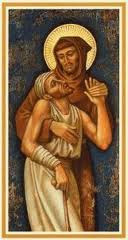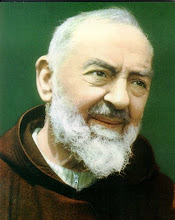Today is October 4th, the feast day of Saint Francis of Assisi and so, being a Franciscan at heart, I just had to write blog post about him. Everyone, I think, is familiar with Saint Francis; common iconography depicts the friar in a brown robe, looking gentle and sweet, as doves flock around him. Stories are told of how he preached to his feathered friends and tamed a wild wolf. He is portrayed merely as a quiet and simple man who loved animals and nature. As an eighth grade catechism booklet I had the misfortune of picking up once said: he’s the patron saint of Environmentalism… right? No. Yet, to my immense disappointment, this seems to be an impression not at all rare. Lots of people miss the entire “point” of Saint Francis. Hence, this blog post.

Saint Francis was born in Assisi in 1182 and was named Giovanni Bernardone by his mother, after Saint John the Baptist. However, his father, Peter Bernardone, was a wealthy cloth merchant who despised his son being named after a wandering hermit in rags. Therefore, little Giovanni was granted the nickname “Francesco,” after the country in which Peter made his fortune— France.
Francesco was a very materialistic young man, and was encouraged in this by his father. However, one day while pursuing a worldly dream of obtaining glory in battle, Francesco was subject to a vision. He heard a voice ask him where he intended to go. As Francesco began to describe his grandiose plans, the voice interrupted him.
“Who can do more good for you—the master or the servant?”
“The master,” Francesco replied.
“Then why are you abandoning the master for the servant, the patron for the client?”
“Sir, what do you want me to do?”
“Go back to your own home and you will be told what to do. You must understand in another way the vision you had.”
Another marvelous exchange followed the first, and while the young man was praying in a dilapidated church known as San Damiano the crucifix above the abandoned altar came alive. The crucified Christ spoke to the twenty three year old, saying. "Francesco, don’t you see that my house is being destroyed? Go, then, and rebuild it for me."
Taking this literally, Francesco began a somewhat eccentric mission to do just that, taking and selling some of his father's cloth to raise money for San Damiano. Tension within the family grew as Peter Bernardone became increasingly angry with his son, whom he considered a thief and whose religious fervor he viewed as an embarrassment. To abbreviate a lengthy series of events, I’ll only say that it ended with Francesco disinheriting himself. There is no evidence that Francesco was ever reconciled with his family.

Thus began the second life of Francesco Bernardone, the life of a holy beggar. And thus we see the first virtue worthy of imitation in Francis: poverty.
Possessionless and content that way, he wore a plain brown robe with no shoes. He did not own anything, even the smallest shelter, but slept in doorways and under the starry sky. When other men began to follow him and it became necessary to find a more permanent place to sleep, even then did Francesco insist that the buildings and land not be theirs. His followers--known as the Friars Minor--were not permitted to beg for more than what they would require for that day. The life of these missionaries was a life of extreme poverty. I would like to think that I could live that way (though I probably couldn't) because there is so much to gain from owning nothing. We cannot rely on our own material wealth, but are forced to depend on God for our daily bread. The poor must trust in the Lord much more than the rich! Also, we are free from distractions--like facebook and television and worry--and have more time for Our Lord. Francesco would often remove himself from the world to meditate and to pray. How holy would we be if we could leave behind work and family to spend time in Adoration each day and night? Francesco also practiced poverty of education. Though he was more learned than most in his time, he was never well educated. He also did not permit his Friars to own books and, according to tradition, did not wish to join the Friars Minors with the Order of Preachers because he did not want his Brothers to be very educated. Education is a sore temptation. Oh, yes, God gave us our minds and our reason, and we most certainly should use them. However, education can be a grave hindrance to one’s spiritual well being. Here’s my logic: if one is extremely educated, they may come to believe that they know everything there is to know. A person who is used to knowing everything will be hard-pressed to admit that they are wrong, or that there is something they are ignorant of. Can you see how trust in God would be difficult, then? Perhaps that is why so many atheists seem such educated men: their education has led to a pride which keeps them from admitting that they do not know all and that there could be certain mysteries they will never understand.

Francesco was not only a model of poverty; he was a model of suffering. Self-imposed suffering, like that of poverty and fasting and being exposed to the elements, were everyday trials for him. In addition, he was often struck down by recurrent bouts of malaria, chronic gastritis, a gastric ulcer that refused to heal, a terrible eye infection and bad eyesight, and, some say, leprosy. He also had the Stigmata—and for those of you who don’t know what that is, it is the wounds of Christ in one’s hands, feet, and side. Saint Padre Pio had the Stigmata as well, and since he lived more recently, we have pictures:

Saint Francesco, like Padre Pio, received his Stigmata during a vision, in 1224. Some accounts say he not only bore the wounds of Christ in his feet, but also the nails themselves. Saint Francis lived with the Stigmata for two years, until his death at the age of 44. His suffering provides us with other examples of holiness and virtue. The first is patience. A man who is ill-burdened in life, weighted down by his personal cross, must be patient in order to endure. The second is humility. This is most obvious in illnesses which, like Francesco's as the end, require one to be cared for by others. This dependency shows us how weak we truly are as human beings, and helps us to learn dependency on God as well. Suffering also provides the cross-bearer with sympathy for his fellow man, the weak, and the struggling. Finally, the best part of suffering as Saint Francis did is that one is able to teach others these virtues. And if people don't pay attention? No matter. Offer the graces up for the souls in Purgatory, women considering abortions, priests, the conversion of sinners, etc. How many people one can help by giving to others the graces they have earned! From Saint Francis, we can learn to suffer well. If we do as he did, we will learn the above virtues, too!
Now, is the point of this post to say that Saint Francis didn't really like animals? No, not at all. I'm sure he did. But I think it would be wrong to say that he loved animals for their sake. Francesco liked animals because they were God’s creatures. Just as an artist reveals himself through his artwork, so does God reveal Himself through His Creation. One can come to know certain aspects of God by studying the animals, then, and trees, and bugs, etc. Francesco also used the animals to make a point. When the people wouldn’t listen to him, he’d turn to the animals and preach. “See! Even the dumb birds know their Creator and praise Him! Why don’t you?” So, the animals weren’t valuable in themselves; they were valuable insofar as they taught human beings about God, and I maintain that view today. There was very little tree-hugging in Francesco’s day, and Saint Francis wasn’t vegan. That is the point of this post. There is so much to learn from Saint Francis that it would be silly to know him as only the effeminate dude who talked to the birdies.

______________________________________
If you’d like to know more about Saint Francis, I suggest:
“The perfect Joy of Saint Francis,” by Felix Timmermans
“Reluctant Saint,” by Daniel Spoto
“Novena,” by Barbara Calamari & Sandra DiPasqua
And of course
“The Rule of Saint Francis,” by the man himself



















